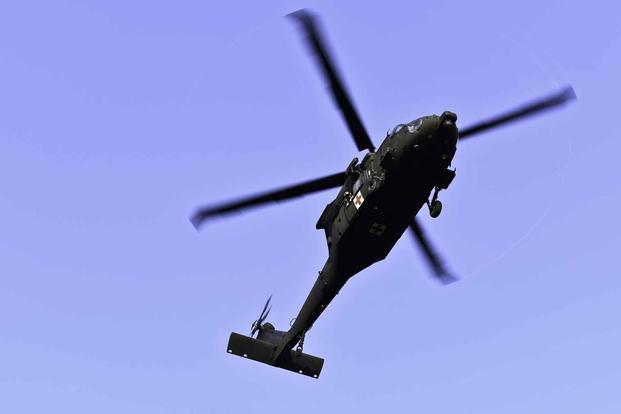An Army officer appears to have crashed one Black Hawk helicopter, then run to another that he subsequently crashed, triggering a large explosion and killing himself, according to the service's investigation into a 2022 incident -- parts of which were obtained by Military.com. Investigators ruled the death a suicide.
Just before 2 a.m. on March 30, 2022, emergency crews swiftly responded to a crashed helicopter at a Fort Stewart, Georgia, airfield. While assessing the damages and frantically searching for casualties, fire crews heard a second aircraft explode.
The next day, the Army said Capt. James Bellew, 26, had died in the incident, but declined at the time to provide further details about what had happened or say if he had taken his own life.
Read Next: Gender Neutral Standards, Return to Old Fitness Test: Congress' Dueling Ideas for the Army
According to redacted sections of the investigation released on Wednesday to Military.com as part of a public records request, Bellew made "casual" inquiries the day before the crashes on whether a soldier's family would receive life insurance after a suicide and whether a family would be held financially liable for damages to Army equipment. Investigators said Bellew's roommates, whose names were redacted, also said that Bellew had asked whether "someone could access an aircraft alone without anyone noticing."
Early on the morning of March 30, air traffic controllers called for first responders after seeing sparks on the tarmac they believed were caused by helicopter blades smashing into the surface. One of the air traffic controllers told investigators he saw a person run from that first Black Hawk to a second helicopter before the latter took off. That second craft subsequently crashed and exploded.
Bellew's romantic partner contacted the Red Cross shortly before the incident, saying she received messages and a call from Bellew, a medical officer, saying he planned to end his life. A search of his belongings after his death revealed messages from friends and family concerned about his mental health, self-help reading material and a handwritten note with statements of affirmation, according to the Army investigation, which concluded in August 2022.
The documents obtained by Military.com said Bellew had no history of diagnosed mental illness or suicidal ideation.
The Army has long struggled with identifying and treating soldiers suffering from mental illness or going through struggles that can lead to suicide. With a shortage of mental health counselors, access to resources differs from base to base as the Army faces an uphill battle staffing its hospitals while competing with the private sector. The Army also has no clear policy on identifying suicidal ideation or servicewide systems on intervention.
Some installations have had to revert to ad hoc policies, such as Fort Liberty, North Carolina, not releasing soldiers from in-patient care ahead of weekends or holidays; and Fort Drum, New York, putting resources in relationship and financial counseling.
In May, Military.com reported on an incident involving Army Spc. Austin Valley, who died by suicide only a month after he made an initial attempt on his life. At Fort Riley, Kansas, Valley seemingly received no consistent care and was under virtually no supervision. He scheduled a mental health appointment off-base that he intended to pay for out of pocket, but he died before the appointment.
Bellew was assigned to the 2nd Battalion, 3rd Aviation Regiment, 3rd Combat Aviation Brigade, 3rd Infantry Division. He had served at Fort Stewart since 2018, after previously being stationed at Camp Casey, South Korea. He became an aeromedical evacuation officer in 2019.
Bellew was a platoon leader in his company, where his daily duties included medical evacuations at Fort Stewart, including moving critically ill COVID-19 patients to off-post medical facilities. His awards include an Army Achievement Medal, Army Aviator Badge and the Expert Field Medical Badge.
Veterans and service members experiencing a mental health emergency can contact the Veteran Crisis Line at 988, Press 1. They also can text 838255 or chat online at VeteransCrisisLine.net.
-- Steve Beynon can be reached at Steve.Beynon@military.com. Follow him on Twitter @StevenBeynon.
Related: A Soldier Attempted Suicide in Poland. Left to Roam at Fort Riley, He Killed Himself.














